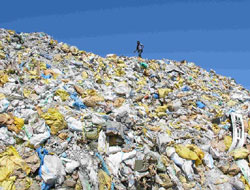This Place Is a Dump...We'll Take It!
 Could converting the huge amounts of garbage sitting in landfills around the world into biofuel be the answer to the growing energy crisis and a means of wrangling out-of-control carbon emissions?
Could converting the huge amounts of garbage sitting in landfills around the world into biofuel be the answer to the growing energy crisis and a means of wrangling out-of-control carbon emissions? New research has shown that converting the rubbish that fills the world’s landfills into biofuel may be the answer to both the growing energy crisis and to tackling carbon emissions. The research published in Global Change Biology: Bioenergy, reveals how replacing gasoline with biofuel from processed waste could cut global carbon emissions by 80%.
Biofuels produced from crops have proven controversial because they require an increase in crop production which has its own severe environmental costs. However, second-generation biofuels, such as cellulosic ethanol derived from processed urban waste, may offer dramatic emissions savings without the environmental catch.
“Our results suggest that fuel from processed waste biomass, such as paper and cardboard, is a promising clean energy solution,” said study author Associate Professor Hugh Tan of the National University of Singapore. “If developed fully this biofuel could simultaneously meet part of the world’s energy needs, while also combating carbon emissions and fossil fuel dependency.”
Is Garbage The Solution To Tackling Climate Change?
The team used the United Nation’s Human Development Index to estimate the generation of waste in 173 countries. This data was then coupled to the Earthtrends database to estimate the amount of gasoline consumed in those same countries.
The team found that 82.93 billion litres of cellulosic ethanol could be produced from the world’s landfill waste and that by substituting gasoline with the resulting biofuel, global carbon emissions could be cut by figures ranging from 29.2% to 86.1% for every unit of energy produced.
“If this technology continues to improve and mature these numbers are certain to increase,” concluded co-author Dr. Lian Pin Koh from ETH Zürich. “This could make cellulosic ethanol an important component of our renewable energy future.”
Image: D’Arcy Norman
There’s certainly no shortage of urban waste to work with, unlike biofuel from crops which requires an increase in crop production which in turn has its own ecological costs.
The full journal reference is: Shi et al. The biofuel potential of municipal solid waste. GCB Bioenergy, 2009; DOI: 10.1111/j.1757-1707.2009.01024.x
For More Information: EcoSalonSource 2: Science Daily
You can return to the main Market News page, or press the Back button on your browser.


